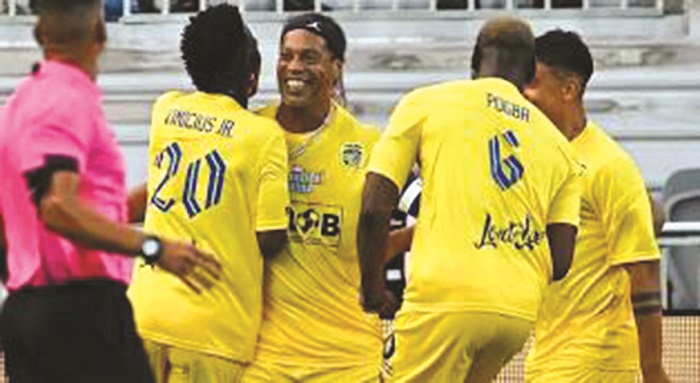
To anyone who might doubt the truthfulness or usefulness of the advice contained in the above headline above, I have the following evidence to offer in support of my advice:
- Without being alerted by my sons, I would never have noticed that Pele and Jairzinho (among others from Brazil ) had been replaced in the fabulous world footballers’ bible by Ronaldo, Ronaldino and Niemar. Nor would I have realised that the Dutch football crowds were chanting a new name – Ruud Gullitt – as Johannes Cruyff had quietly betaken himself onto the coaches’ bench.
- I would also have retained my erroneous notion that cricket was only played by moneyed gentlemen from England, Australia or New Zealand, and In would have been completely unaware of the terror such players were facing against black and brown-skinned guys from Antigua, Trinidad and Tobago and Guyana,as well as Pakistan, India and Sri Lanka.
- The term “pad up” would not have meant anything to to me, as I had never entertained the idea of changing my gender!
Furthermore, I doubt whether I would ever have gone through the experience of yelling the name of a racing driver called Mr Patrick Tambay and successfully thrust an autograph sheet into his hands, as he was emerging from his Formula 1 mobile home at Brands Hatch, England. Certainly, not after the bodyguard of another driver, then World Number One, Nelson Piquet, had snobbishly brushed me away, stating coldly: “Mr Piquet does not sign autographs!”
Nor would I have gathered the courage to push aside the crowd at at White Hart Lane, in London, and walk up to Glenn Hoddle to get his autograph and – take in the fact that n he had very blue eyes.
Yes, I’d do ANYTHING to get my boys to brag to their playmates, “My Dad did that!”
Such acts of child-inspired bravado did have their cost, at times, though. But I’d better begin at the beginning.
I had begun to take cricket seriously when the West Indies team toured England in 1984 and inflicted on the home team, a 5-nil series defeat so devastating that a new word was coined to enshrine the feat in cricket lore, namely, “blackwash”!
When this event occurred, I was living at Clapham Common in South London, and spending my lunch-time hours – all alone – in a pub called The North Pole.
As a newcomer to the pub, the regulars largely ignored me (as is common in England). In fact, I would have stopped going there, except that they served draught Stella Artois lager, and as a Ghana Club beer addict, this was the only beer in England at the time that I could tolerate.
However, as the West Indies began to take the England batters to the cleaners, in the pub threw admiring remarks in my direction. On one occasion, someone said, “Your guys are unbelievably good!” And he bought me a drink!
I was “in”.
I didn’t need a sociologist to put into context for me, the role that sports can play in making social contact possible between people otherwise separated by factors such as race and/or class.
So when I got a job at a magazine called South, which was run by a Pakistani businessman called Altaf Gauhar, I paid serious attention to what the Pakistani members of the staff said about cricket. I noticed that everyone worshipped a house artist called Javed (because the best international Pakistani batter at the time, was called Javed Miandad.)
By coincidence, my son had, a few months before I joined the magazine, enrolled in a college that had at least, three cricket fields. Quite often, when I went to pick him up after school, I would find him at the cricket fields. Yes – the son of an Asiakwa “bushman” like me, was becoming adept at a game unknown at Asiakwa, called cricket!
One day, his mother and his brother came with me when I went to pick him up. We saw him bowling. We lounged beneath the shade of the trees that surrounded the lush cricket field.
Whether he saw us not, he quickly took three wickets! b
We cheered loudly each time he took a wicket. We didn’t know it but apparently, this was “bad form” at the college. Derisive fingers were pointed at the “Duodu cheering club”!
We learnt later that outstanding performance (and especially gloating when someone excelled!) was frowned upon. Anyone who showed too much interest in a game was contemptuously dubbed a “keeno”!)
Anyway, we didn’t care! What we had seen was enough to convince me and his mum to take the idea of his being properly equipped for cricket seriously. This meant buying him expensive cricket boots, a bat, pads, gloves, and a helmet, plus a box called a “coffin”, in which to deposit these possessions.
Once he was adequately equipped, I took him to the Grover School of Cricket, to take lessons from a former player who was so good at teaching the game that the great Vivian Richards of the West Indies team, had taken tutorials from him.
I also took him to the very famous Lord’s cricket ground, (“home” of cricket) where there were bowling machines and expert tutors.
Now some of my colleagues at South Magazinehad entered the paper in a league of cricket teams, whose membership included the London Times, and they added my boy to their team. So, on many a Saturday morning, I chauffeured him to one of the almost-hidden but extremely beautiful cricket grounds dotted not too far from Central London.
On one occasion, someone in the South team didn’t turn up, and I was pencilled in as “twelfth man”. I had been asked to bring playing equipment, but was assured that I could expect not to play.
But all too soon, all the batters in our team were bowled out!
I could not believe my ears when our great captain, Javed, shouted out to me, “Cameron, pad up!”
WHAAAAAT?
In the next minute, our last man was bowled, and I had to make my way to the crease.
I stood in front of the stumps.
I waited, bat at the ready.
The opposing bowler came.
He began his run-up.
I then did a strange but instinctive thing.
I closed my eyes!
Somehow, the ball found its way to my bat!
Having closed my eyes, I didn’t see it. But I felt a sharp pain transmitted from my bat to my palm.
The ball had hit my bat at dead centre!
I heard someone from our side shout, “RUN!…. RUN!!”
I ran.
When I reached the other stumps, another person shouted: “RUN AGAIN!… RUN AGAIN!!”
I ran again.
I got back safely to my stumps.
That’s how, in one of the score-books used by tiny cricket clubs in London, a serious researcher may find, penned against my name, “TWO NOT OUT”!
Two Not Out! On a cricket Scorecard.
And I owe all those bragging rights to – taking my child’s interests seriously!
I told you, didn’t I?
BY CAMERON DUODU





